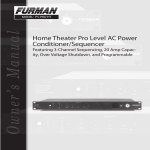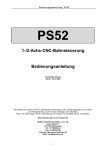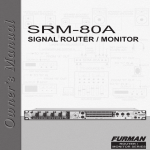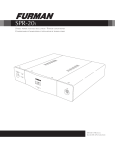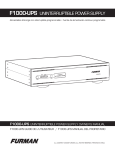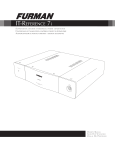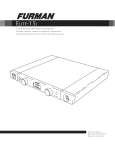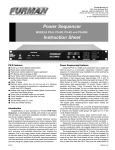Download Furman Sound PS-PRO User's Manual
Transcript
PS-PRO - POWER CONDITIONER/SEQUENCER PS-PRO - POWER CONDITIONER/SEQUENCER Congratulations on your purchase of a Furman PS-PRO Power Conditioner/Sequencer. The PS-PRO is one of Furman’s top-of-the-line PRO Series, offering maximum protection from the AC line hazards faced by delicate analog and digital pro audio and video F E AT U R E S l 20 amp (2400 watt) rating handles even the largest amps l Multiple levels of protection components can safely absorb large voltage spikes and provide highly effective RF filtering — the most comprehensive protection available anywhere! l Extreme Voltage Shutdown guards against catastrophically wrong voltages l Power Status LED’s indicate which outlet groups have power l Mains Wiring indicators monitor wiring integrity, show Normal and five kinds of faults l Remote operation allows turn-on and turn-off at a distance simply by connecting a momentary or maintained-contact switch (and LED if desired) l Multiple units may be linked to handle higher currents and/or more than three delay groups l Six switched outlets (on rear panel), and three unswitched outlets (one front, two rear) l Ten foot 12 AWG heavy duty power cord l Three year limited warranty 1 DESCRIPTION The PS-PRO is a power sequencer, meaning it is capable of powering a rack full of equipment in three steps separated by timed delays. It is useful whenever various kinds of equipment must be powered up or down in groups, rather than all simultaneously. In audio systems, sequenced powering is often necessary to allow turn-on transients from low level amplifiers and processors to settle down before any power amps are turned on, because simultaneous powering would result in a loud, annoying, and potentially destructive “pop” reaching the speakers. And in any large system whose components present an inductive load to the AC line (including electric motors, power supplies, and power amplifiers of all kinds), sequenced powering can avoid excessive inrush currents that can cause circuit breakers to trip even though the steady-state currents are not excessive. Power sequencing is particularly suited to applications where large installations must be switched by inexperienced personnel. The PS-PRO is controlled by a front panel key-operated switch to provide security from non-authorized users tampering with the system. The switch has three positions: OFF, ON, and REM, allowing for local or remote control. With remote control, one or more PS-PRO’s may be installed in remote locations with on/off control and LED monitoring via low-voltage control wires. Besides its power sequencing capabilities, the PSPRO contains many other conditioning and protection features. Both aspects of its functioning will be discussed in the next sections. I N S TA L L AT I O N PS-PRO - POWER CONDITIONER/SEQUENCER R E CO M M E N DAT I O N S In audio/video installations, we recommend that power amps receive power last — plug them all into Delay 3 or divide them into two groups and plug one group through Delay 2 and the other through Delay 3. Low level equipment such as mixers and signal processors should use Delay 1. Equipment incorporating clocks or timers such as VCR’s, or equipment that must respond to wireless remote actuation, should use the unswitched outlets. We suggest keeping the front panel unswitched outlet free for equipment that is only in use temporarily. The overall capacity of the PS-PRO is 20 amps. This refers to the combined steady-state current drawn by all devices plugged into all of its nine outlets. If this combined current level exceeds 20 amps at any time, the circuit breaker will trip, cutting off power to your rack. If this occurs, you must reduce the load by unplugging one or more units from the PS-PRO. Then push the white button on the circuit breaker (on the front panel) in to reset it. Although 20 amps is an absolute limit, the PS-PRO will allow you to come as close as possible to using the full 20 amps, because with power sequencing, the risk of tripping the breaker is greatly reduced. This is because the PS-PRO handles large but temporary inrush currents in stages, rather than simultaneously, allowing each stage to settle to its steady-state current draw before the next stage is powered. Outlets and Plugs: The PS-PRO’s four rear panel outlet pairs are standard 120V, 20A duplex types. These outlets are widely spaced, to accommodate one bulky plug-mounted “wall wart” power supply in each without covering up an adjacent outlet. The front panel outlet is limited to 15 amp use. The PS-PRO also uses a 20 amp line cord, which can be recognized by the perpendicular blades on the plug. In 20 amp products, use of a plug of this type is required for UL safety certification. It is compatible with 20 amp outlets (such as the ones on the PS-PRO’s rear panel.) For more information about 20 amp plugs, see the information sheet “What Kind Of Plug Is This, Anyway?” that accompanied this manual, or request a copy from Furman. POWER SEQUENCING F E AT U R E S The PS-PRO rear panel provides one unswitched outlet pair and three switched outlet pairs. The switched outlet pairs are labeled Delay 1, Delay 2, and Delay 3. (The other pair of outlets on the rear panel and an additional single outlet on the front panel are unswitched.) Here’s how the PS-PRO works: When an ON sequence is initiated, power is immediately applied to the Delay 1 outlets. Power is then applied to Delay 2 and Delay 3 outlets per the 1-60 second total delay setting you choose with the front panel Delay Adjust control. The screwdriver-settable Delay Adjust controls the total delay time between the Delay 2 and Delay 3 outlets. For example, if the Delay Adjust control is set to 30 seconds, Delay 1 outlets will go on immediately, Delay 2 outlets will receive power 15 seconds after Delay 1 outlets, and Delay 3 outlets will receive power 15 seconds after Delay 2 outlets. Therefore the total delay time is 30 seconds. The order is reversed on an OFF sequence. For example, when an OFF sequence is initiated and the Delay Adjust control is set at 60 seconds, Delay 3 outlets lose power immediately, Delay 2 outlets lose power 30 seconds later and Delay 1 outlets lose power 30 seconds after the Delay 2 outlets have been shut off. The total delay time is 60 seconds. In the event of a power out, of course all equipment plugged into a PS-PRO will lose power simultaneously. However, when power is restored, the delayed outlet groups will again turn on in the usual delayed sequence (if set to maintained on mode). 2 PS-PRO - POWER CONDITIONER/SEQUENCER POWER CO N D I T I O N I N G F E AT U R E S The PS-PRO provides a very high degree of power conditioning protection for your expensive and delicate equipment. What sets Furman’s top-of-theline PRO-level protection apart from that offered by other conditioners is the quantity, quality, and configuration of its suppression devices. These include MOV’s, gas discharge tubes, fast-blow fuses, and high voltage inductors and capacitors. This unique combination can safely absorb and dissipate large spikes from nearby lightning strikes and other sources (up to 11,000 amps across any wiring mode — line-neutral, line-ground, or neutral-ground), as well as highly attenuate audible high frequency noise. Clean, filtered power is provided at all 9 outlets, even the unswitched ones. The PS-PRO also includes special circuitry to detect additional wiring faults, with several front panel LED status indicators. The PS-PRO will even keep itself from turning on, or will shut down under extreme conditions, if the voltage falls below 80 volts or rises above 140 volts. This feature is called “Extreme Voltage Shutdown.” It is particularly valuable in the entertainment industry, where equipment is frequently moved to different venues, and accidental connection to 220V is a real possibility. See pages 5-6 or more information on the various protection features’ indicator lights. Despite its many protective features, you should be aware that the PS-PRO does not compensate if the AC line voltage itself is high or low (i.e., it does not compensate for brownout conditions). If you frequently move your rack to different locations, derive power from generators, use long extension cords, travel internationally, or are in an area particularly prone to brownouts, you may benefit from the use of one of Furman’s AC Line Voltage Regulators in addition to the PS-PRO. If you do use a voltage regulator, run the raw power line into the regulator 3 first so that the PS-PRO receives a stabilized voltage to distribute. MA I N S W I R I N G FAU LT A N A LY Z E R The PS-PRO also assists in analyzing any faults that may occur in the AC mains wiring. Two green and one red neon indicators light in a specific pattern for normal wiring and in different patterns for various faults. When the AC wiring is correct, both green indicators will be lit, but not the red indicator. If any other pattern of indicators is lit, a fault is present. The chart next to the indicators identifies the fault’s exact nature. Since any wiring fault presents a potentially serious safety hazard, the assistance of a qualified electrician should be obtained in correcting the problem. O N or O F F SEQUENCING The method of initiating an ON or OFF sequence depends on whether the unit is to be controlled locally or remotely. If remotely, it further depends on the type of switch or switches used (momentary or maintained). LOCAL CONTROL For local control, an ON sequence is initiated by turning the key switch to the ON position, and an OFF sequence by turning the key switch to REM or OFF position. The START ON-OFF SEQUENCE pushbutton is not normally used in local operation. NOTE: If the PS-PRO is to be used under local control only, and a jumper is installed on JMP1, and no switch is connected to the PS-PRO’s terminal strip, PS-PRO - POWER CONDITIONER/SEQUENCER then a jumper should be connected between the REM and +12V terminals. Otherwise, turning the front panel key switch to the REM position will turn the PS-PRO ON. REMOTE CONTROL When the PS-PRO’s front panel key lock switch is in the REM position, it may be controlled by one or more switches in remote locations. In the most basic configuration, only two wires and an SPST switch are needed to initiate an ON or OFF sequence. The switch may be either a momentary or a maintainedcontact type, depending on a jumper setting inside the PS-PRO. If an additional wire is used, an LED may also be installed at the remote end to indicate that the power is on. terminals are momentary tied together, the PS-PRO will sequence ON or OFF. JMP3 (MAINT OFF), when the REM and +12V terminals are tied together, the PS-PRO will sequence ON. JMP4 (REM TO GND = ON), when the REM and GND terminals are tied together, the PS-PRO will sequence ON (Note: JMP1 must have a jumper installed). JMP5 spare jumper holder. MOMENTARY vs. MAINTAINED CONTACT SWITCHING An on-off switch of either kind may be used to actuate the PS-PRO’s remote operation. Maintained switches, such as most toggle switches and push-on/push-off button switches, (including the Furman RS-1 key lock switch), stay open until switched, and then remain closed until switched again. Momentary switches, usually pushbutton types like the Furman RS-2 (which also provides a locking key switch), are normally open and stay closed only as long as the button is pressed. Maintained switches are generally the most convenient when there is only one remote location. When more than one location is required, momentary switches offer the advantage of a turnon or turn-off sequence which may be started from any location. The PS-PRO main circuit board has 5 pairs of terminals (PCB REV D and later) labeled as: JMP1 (Default) (MAINT ON) , when the REM and +12V terminals are tied together, the PS-PRO will sequence OFF. JMP2 (MOMENTARY), when the REM and +12V PS-PRO units come factory-set for maintained operation (jumper is installed on JMP1). They may be easily converted to other operating modes by moving jumper plug/plugs on the PS-PRO’s circuit board. To do this, first disconnect the unit from AC power. Remove the six screws that secure the top cover and one screw from the front panel. Just install the jumper plugs to the desired mode of operation. Reattach the top cover. MAINTAINED MODE There are 3 maintained modes of operation: REM to +12V = OFF (jumper plug installed on JMP1, MAINT ON) MAINTAINED MODE (continued) (continued on page 7) 4 PS-PRO - POWER CONDITIONER/SEQUENCER FRONT PANEL START ON/OFF SEQUENCE: This pushbutton switch is used only when the key lock switch is in REM position and the PS-PRO is in Momentary Mode. It then acts the same as any other remote momentary switch that may be connected to the rear panel terminal strip. If the switched outlets are on, pushing it begins an OFF sequence. If they are off, pushing it begins an ON sequence. Do not use this switch when in Maintained Mode. PROTECTION OK: This LED is normally on when the power to the PS-PRO’s outlets is switched on. It monitors the integrity of the protection devices and reports if the protection is compromised. If an extremely large spike is encountered that exceeds the PS-PRO’s capacity, the main group of input protectors will blow an internal fuse, causing the indicator to go out. If this LED is not lit when the power switch is on, full protection is not functioning. Spike protection may still exist, but will have a reduced capacity to absorb current. If this LED is not lit, please contact the Furman Service Department. EXTREME VOLTAGE SHUTDOWN: This LED indicator is normally off. It monitors a hazard common in the entertainment industry—wiring faults—for example, accidental connection to 220V. The PSPRO senses voltages that are so high or low that operation would be impossible (under 80V or over 140V) and shuts the power down before damage can occur. Upon initially applying power to the PSPRO, this indicator will be lit if the unit is receiving below 80 volts or more than 140 volts, and power will not be applied to the PS-PRO’s outlets. If the unit has been operating with an acceptable input voltage and then the voltage goes out of the acceptable range, the PS-PRO will shut down power to all of its switched outlets simultaneously, without observing the OFF delay cycle, and this LED will 5 begin flashing. When power returns to within the acceptable range, the PS-PRO will observe its ON delays as it returns power to its switched outlets, and this LED will go out. NOTE: If the mains power is below 80 volts and has caused the PS-PRO to remove power from its outlets, the PS-PRO will not restore power to its outlets until the mains voltage is more than 90 volts. If the mains power is above 140 volts and has caused the PS-PRO to remove power from its outlets, the PS-PRO will not restore power to its outlets until the mains voltage is less than 130 volts. The reason for this is to prevent the power oscillating on and off in marginal conditions. DELAY ADJUST: This screwdriver-adjustable trimpot allows you to set the total turn-on/turn-off delay time from 1 to 60 seconds, as explained on page 6. The trimpot adjusts both the on delay and off delay times simultaneously. Turn the trimpot clockwise to increase the on and off delay times; turn the trimpot counterclockwise to decrease the delay times. POWER STATUS (DELAY) LEDs: One green LED is provided for each of the three delay stages. Each LED lights when power is applied to its corresponding duplex outlet on the rear panel. All three LEDs then remain steadily lit until power is removed. During the power-down delay cycle, each LED goes off as power to its corresponding outlet is removed. In addition, the Delay 1 LED flashes if a remote switch (or the stored state) is OFF. MAINS WIRING INDICATORS: The PS-PRO assists in analyzing any faults that may occur in the AC mains wiring. Three neon indicators (two green and one red) light in a specific pattern for normal wiring and in different patterns for various faults. When the AC wiring is correct, both green indicators will be lit. If a fault is present, the chart immediately above the neon indicator will identify the exact nature of the PS-PRO - POWER CONDITIONER/SEQUENCER fault. Since any wiring fault presents a potentially serious safety hazard, the assistance of a qualified electrician should be obtained in correcting the problem. NOTE: The Mains Wiring indicators and status LEDs stay on even when the power switch is off. This feature allows you to check the mains wiring before powering up your equipment. These indicators are designed for continuous, ongoing use. Like a clock, they consume very little power. UNSWITCHED OUTLET: This convenient outlet provides power at all times when the PS-PRO is plugged in and operating under normal power conditions. ON/REM/OFF SWITCH: When turned to the ON position, this key lock switch initiates an ON sequence, applying power to the PS-PRO’s switched outlets. When turned to the OFF position, it begins an OFF sequence. In the REM position, the PS-PRO will accept on/off commands from a remote switch or switches that may be connected to the rear panel terminals. CIRCUIT BREAKER: The overall capacity of the PS-PRO is 20 amps. If the combined steady-state current drawn by all devices plugged into all of its nine outlets level exceeds 20 amps at any time, the circuit breaker will trip, cutting off power to your rack. If this occurs, you must reduce the load by unplugging one or more units from the PS-PRO, and reset it. You can reset the circuit breaker by simply pressing in the button, which pops out when tripped. However, because it is a thermal type, you may have to wait a few moments after it trips for it to cool down before it will allow you to reset it. UNSWITCHED OUTLETS: The PS-PRO rear panel provides clean, filtered power to this pair of unswitched outlets, adjacent to the power cord. SWITCHED (DELAYED) OUTLETS: The PS-PRO rear panel provides three pairs of switched outlets, widely spaced to allow use of equipment with plug- in (wall wart) transformers. These switched outlet pairs are labeled Delay 1, Delay 2 and Delay 3. After the front panel switch is thrown to ON, Delay 1 outlets receive power instantly, Delay 2 outlets receive power 1-30 seconds later and Delay 3 outlets receive power 130 seconds after Delay 2 outlets are powered. When thrown to OFF, the sequence is reversed, with Delay 3 losing power instantly, Delay 2 outlets losing power 1-30 seconds later and Delay 1 outlets losing power 1-30 seconds after Delay 2 outlets are shut down. The delay intervals may be altered with the screwdriver-adjustable Delay Adjust control on the front panel. TERMINAL STRIP: Allows one or more switches to be connected to turn the PS-PRO on and off from a remote location. Two, and sometimes three, wires are needed to install a remote switch (see “Maintained Mode”, page 6.) If a four-conductor cable is used, an LED may be installed at the remote end to indicate that the power is on. REAR PANEL 6 PS-PRO - POWER CONDITIONER/SEQUENCER The connection of the REM terminal to the +12V terminal initiates an OFF sequence. Disconnecting initiates an ON sequence. If the cable run is long, it is recommended that the REM wire be tied to the PS-PRO’s GND terminal during ON operation rather than leaving it floating. This will require the use of a third conductor and a double-throw switch. REM to +12V = ON (jumper plug installed on JMP3, MAINT OFF) The connection of the REM terminal to the +12V terminal initiates an ON sequence. Disconnecting initiates an OFF sequence. If the cable run is long, it is recommended that the REM wire be tied to the PS-PRO’s GND terminal during OFF operation rather than leaving it floating. REM to GND = ON (jumper plugs installed on JMP1 and JMP4) The connection of the REM terminal to the GND terminal initiates an ON sequence. Disconnecting initiates an OFF sequence. NOTE: In Maintained Mode DO NOT USE the “START ON-OFF SEQUENCE” switch on the front panel. If you do you may activate an unintended sequence. If a Furman RS-1 is the controlling switch contact Furman’s Tech Support department for the proper wiring diagrams. REM to +12V = OFF 7 MOMENTARY MODE In Momentary Mode (jumper plug installed on JMP2) The PS-PRO has “memory” — it only needs a momentary signal from the remote switch to change its state from ON to OFF. When first plugged in (or after power is lost and reapplied for any reason) the stored state is OFF, and the DELAY 1 LED will flash. The unit will stay off until sequenced ON by a momentary connection of the REM IN terminal to +12V (the key switch must be in the REM position). The sequence starts on the rising edge of the signal. The front panel START ON-OFF SEQUENCE switch is in parallel with, and functionally equivalent to, one or more remote momentary switches that may be connected to the terminal strip in the rear. The “memory” is independent of the key switch. This means that even if the unit is sequenced off by turning the key lock switch to OFF, when the key lock switch is turned back to REM, the unit will sequence back on — it will not be necessary to push the START ON-OFF SEQUENCE button again. The unit “remembers” its state until the incoming power is lost, in which case it would default back to OFF. MOMENTARY MODEis not the primary The front-panel key lock switch means of control in the momentary mode and should normally be left in REM. It may be a useful secondary means of control in the rare case of having several PS-PRO’s in parallel if there is some reason to shut down one unit without affecting the others. Because it is a maintained-contact switch, the RS-1 is not an appropriate remote switch for the PS-PRO - POWER CONDITIONER/SEQUENCER RS-2 is the proper choice. Please contact Furman for RS-2 wiring diagrams. MULTIPLE UNITS You can use more than one PS-PRO to handle loads that exceed 20 amps (16 amps PRO-E). To control them remotely with one or more remote switches, connect (in parallel) the REM, +12V (and optionally GND) terminals of all units. Be sure that the mode (momentary or maintained) of all units is set the same. Set all key lock switches to REM. Connect a single maintained switch or one or more momentary switches to the nearest PS-PRO, as discussed in the sections above. To avoid tripping house breakers, the power input for each PS-PRO should come from a separate 20 amp AC circuit. If you are unsure whether your building’s wiring can accommodate multiple fully-loaded PS-PRO’s or PS-PROE’s, consult a qualified electrician. If multiple PS-PRO’s are controlled by one or more momentary remote switches, all of the PS-PRO’s will change state (from on to off or vice versa) on each rising edge of the voltage on the REM IN terminal. All remote switches or START ON-OFF SEQUENCE pushbuttons on any unit’s front panel will toggle all of the units. The key lock switches on each unit’s front panel will turn off an individual unit that is currently on without affecting the other units. The STATUS lines work the same in either mode. Each reflects the true state of the unit’s outlets and is affected by both the “memorized” state and by the key lock switch. A separate LED must be used to indicate the status of each PS-PRO. To address the unusual (hopefully rare) instance when several PS-PRO’s in parallel fall out of sync, resulting in some units turning on and others turning off when a remote button is pushed, the remote signal line has a special feature: Holding the REM line high for at least 4 seconds (whether by an actual remote switch or by any unit’s START ON-OFF SEQUENCE switch) will force all units to the OFF state, putting them back in sync. This is the only way to re-sync units other than disconnecting AC power to all units. Remember : turning any key lock switch to OFF does not affect the stored state, even though it will temporarily turn the output of that unit off. If it is turned back to REM, the PS-PRO will sequence back to ON because the stored state is still ON. STATUS TERMINAL The STATUS terminal is an output that may be used to illuminate an LED at the remote location indicating that the power is available at the PSPRO’s outlets. If it is high (+5V), the unit is ON (or at least in the process of sequencing ON); if low, the unit is OFF (or sequencing OFF). Simply connect the indicator LED between STATUS and ground (do not use a series resistor). If the LED does not light when the switch is in the ON position check the polarity and reverse the LED leads if needed. FLASHING DELAY 1 INDICATOR The DELAY 1 LED on a PS-PRO flashes to indicate that a remote switch is off or not connected. In Maintained Mode (JMP1, MAINT ON’s jumper plug is installed), this will only occur when the REM terminal is tied to the +12V terminal. In Momentary Mode, the LED flashes if the stored state is OFF. Since the flashing function is only concerned with the state of the remote switch (or switches), note that it is possible for this LED to flash even when the unit is ON. This could occur when the PS-PRO is under local control (the key lock switch is in the ON position). In this case, DELAY 1 would flash and DELAY 2 and DELAY 3 would be steadily lit. This serves as a warning that the unit will sequence OFF if the key is turned to the REM position. EFFEC TS OF LIGHTNING Lightning is a natural phenomenon of overwhelming 8 PS-PRO - POWER CONDITIONER/SEQUENCER force that represents the most difficult circumstance lightning should be a lightning arrestor installed on faced by a power protection product. The degree your building’s electrical service entrance. If your of protection a PS-PRO can offer depends on the building does not have one, contact your local intensity of the strike. If lightning strikes a distant power company or an electrical contractor to have power line and causes a relatively small disturbance one installed. to reach your location, the spike suppressors in the PS-PRO will absorb the excess voltage invisibly and harmlessly. However, if lightning strikes the actual building where the PS-PRO is installed (or somewhere very nearby), some damage may be unavoidable due to the extremely high voltage and current present. If this does occur, most likely damage will be limited to the PS-PRO itself and will affect only certain spike suppression components (called varistors or MOV’s.) In this “suicide” mode, the PS-PRO may sustain minor damage but generally will protect all equipment plugged into it from much more serious and costly damage as long as that equipment is properly grounded. Proper grounding requires the use of three-prong AC cords, and that the building’s outlets are actually grounded to earth as specified by the National Electrical Code. Any PS-PRO known to have taken a direct lightning hit should be checked by a qualified technician or the Furman factory to determine whether the MOV’s need replacement. (If the PS-PRO’s PROTECTION OK indicator is not lit, there is definitely some damage. Some spike suppression capability may still be available by MOV Bank #2, but there is no guarantee of this.) For optimum protection, you should not rely exclusively on the PS-PRO to protect against a direct lightning hit. The first line of defense against 9 THREE YEAR LIMITED WA R R A N T Y The Furman PS-PRO is protected by a limited three year warranty, covering defects in materials and workmanship, provided that the registration card is filled out and returned by the customer. Otherwise, a one year warranty applies. Products must have a proof of purchase from a Furman authorized dealer. During this period, Furman will make any necessary repairs without charge for parts or labor. Shipping charges to the factory or repair station must be prepaid by the owner; return shipping charges (via UPS Ground) will be paid by Furman. This warranty applies only to the original owner and is not transferable. Also, it does not apply to repairs done other than by the Furman factory or Authorized Repair Stations. This warranty shall be cancelable by Furman at its sole discretion if the PS-PRO unit has been subjected to physical abuse or has been modified in any way without written authorization from Furman. Furman’s liability under this warranty is limited to repair or replacement of the defective unit. Furman will not be responsible for incidental or consequential damages resulting from the use or misuse of its products. Some states do not allow the exclusion of incidental or consequential damages, so the above limitations may not apply to you. This warranty gives you specific legal rights, and you may also have other rights which vary from state to state. Warranty claims should be accompanied by a copy of the original purchase invoice showing PS-PRO - POWER CONDITIONER/SEQUENCER the purchase date (if a Warranty Registration Card was mailed in at the time of purchase, this is not necessary). Before returning any equipment for repair, please read the following important information on service. SERVICE Before returning any equipment for repair, please be sure that it is adequately packed and cushioned against damage in shipment, and that it is insured. We suggest that you save the original packaging and use it to ship the product for servicing. Also, please enclose a note giving your name, address, phone number and a description of the problem. NOTE: All equipment being returned for repair must have a Return Authorization (RA) Number. To get an RA Number, please call the Furman Service Department, (707) 763-1010, Ext. 120 or 121, between 8 am and 5 pm U.S. Pacific Time. Please display your RA Number prominently on the front of all packages. 10 PS-PRO - POWER CONDITIONER/SEQUENCER PS-PRO SPECIFICATIONS Current rating: 20 Amps (2400 Watts at 120 VAC) Input Voltage: 85 to 264 VAC without damage Mains Wiring analyzer: Detects one normal mode and five fault modes Delay Intervals: Total elapsed ON or OFF delay time adjustable from 1-60 seconds, with a single trimpot: ON sequence: Delay 1 outlets go on immediately with switch. Delays between outlets 1 and 2, and 2 and 3, adjustable from 1-30 seconds each OFF sequence: Delay 3 outlets go off immediately with switch. Delays between outlets 3 and 2, and 2 and 1, same as ON delays Remote Switch: Screw terminals, 2 for switch, 2 additional for optional LED (22 ga. minimum) Spike Protection Modes: Line to neutral, neutral to ground, line to ground Clamping Voltage, all modes: 200V peak Response time: 1 nanosecond Maximum surge current: 11,000 amps (8 x 20mS pulse) Maximum spike energy: 550 joules total Noise attenuation: Differential mode: Greater than 40 dB; Common mode: greater than 60 dB; both 1 to 200 MHz Dimensions: 1.75” H x 19” W x 10” D. Weight: 6 lbs (2.7 kg). Construction: Steel chassis, zinc chromate plating; .125” brushed and black anodized aluminum front panel; glass epoxy printed circuit boards. Power Consumption: 11 watts Safety Agency Approvals: UL, NRTL-C, C-UL, CE listed. Optional: 220/240V Versions (units with “E” suffix only) are intended for use in countries with nominal 220 to 240 volt AC mains. Their rear panel outlets use internationally accepted IEC-320 connectors. 0004-090202-D Furman Sound, Inc. 1997 South McDowell Blvd. Petaluma, California 94954-6919 USA Phone: 707-763-1010 Fax: 707-763-1310 Web: www.furmansound.com E-mail: [email protected]















